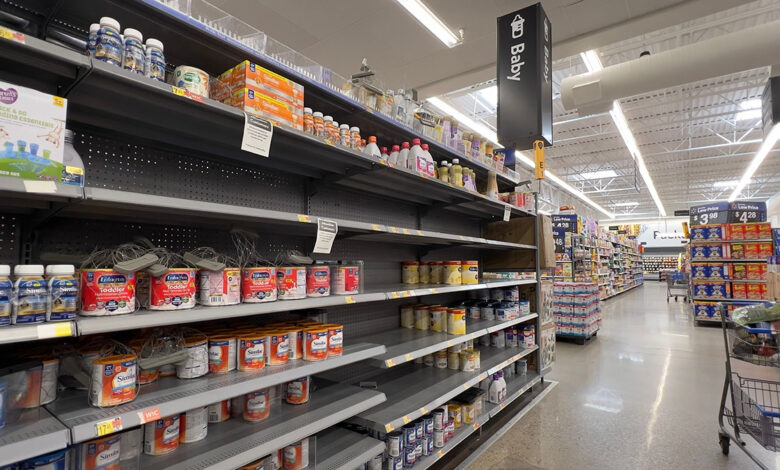Understanding the Recent Baby Formula Recall

Reasons Behind the Recall
The recent baby formula recall has been initiated due to several critical reasons. Primarily, contamination concerns have been raised, with potential bacterial presence being a significant factor. Additionally, mislabeling issues have surfaced, leading to incorrect nutritional information being provided to consumers. These factors combined have necessitated a swift response to ensure the safety of infants.
Affected Brands and Products
Several well-known brands have been impacted by the recall. Parents should be aware of the following affected products:
- Brand A: Specific batches of their infant formula
- Brand B: Certain types of their powdered formula
- Brand C: Select liquid formula products
It is crucial for parents to check the batch numbers and expiration dates to identify if their products are part of the recall.
Immediate Steps for Parents
Parents need to take immediate action if they possess any of the recalled products. The following steps are recommended:
- Stop using the recalled formula immediately.
- Check the product labels for batch numbers and expiration dates to confirm if they are part of the recall.
- Contact the manufacturer for further instructions on how to return or dispose of the product.
- Consult with a pediatrician to discuss safe alternatives and ensure the health and safety of the infant.
By following these steps, parents can mitigate the risks associated with the recalled baby formula and ensure their child’s well-being.
Health Risks Associated with Contaminated Baby Formula
Potential Health Issues
Contaminated baby formula can pose several health risks to infants. These risks include bacterial infections, which can lead to severe gastrointestinal issues. In some cases, exposure to harmful substances in the formula can result in long-term health complications. It’s crucial for parents to be aware of these potential dangers to take appropriate action.
Symptoms to Watch For
Parents should be vigilant in monitoring their infants for symptoms that may indicate exposure to contaminated formula. Common symptoms include:
- Diarrhea
- Vomiting
- Fever
- Unusual fussiness or irritability
If any of these symptoms are observed, it is essential to consult a healthcare professional immediately.
When to Seek Medical Attention
Knowing when to seek medical attention can make a significant difference in the health outcomes for an infant exposed to contaminated formula. Parents should seek immediate medical care if their child exhibits severe symptoms such as persistent vomiting, high fever, or signs of dehydration. In some cases, legal representation for victims may be necessary if the contamination leads to serious health issues. Manufacturers failed to warn about risks, and this negligence can be addressed through a toxic baby formula lawsuit by Morgan & Morgan law firm. Verdicts and settlements for various cases have highlighted the importance of holding manufacturers accountable for the safety of their products.
Steps to Ensure Your Baby’s Safety
Checking Product Labels
Parents should always carefully examine product labels to ensure they are not using any of the recalled baby formula. Look for the expiration date, batch number, and manufacturer details. If any of these match the recalled products, discontinue use immediately.
Safe Alternatives to Recalled Formula
In the event of a recall, parents should consider safe alternatives to the affected baby formula. Options include:
- Breastfeeding: If possible, breastfeeding is the safest alternative.
- Other Brands: Choose baby formula from brands that are not affected by the recall.
- Homemade Formula: Consult a pediatrician before preparing homemade baby formula to ensure it meets nutritional needs.
Proper Storage and Handling of Baby Formula
To maintain the safety and quality of baby formula, parents should follow these guidelines:
- Store formula in a cool, dry place to prevent contamination.
- Follow the manufacturer’s instructions for preparation and storage.
- Use clean and sterilized bottles and feeding equipment.
- Check the formula’s appearance and smell before feeding it to your baby. If anything seems off, discard it immediately.
How to Report Issues and Seek Compensation
When dealing with a baby formula recall, it’s crucial for parents to know the proper channels for reporting issues and seeking compensation. This section provides a comprehensive guide on the steps to take.
Contacting the Manufacturer
The first step is to contact the manufacturer of the recalled product. They often have dedicated hotlines or customer service teams to handle recall-related inquiries. Be sure to have the product details, such as the batch number and purchase date, on hand when you call.
Filing a Report with Regulatory Authorities
Parents should also file a report with regulatory authorities like the FDA. This helps in tracking the scope of the issue and can lead to more effective recalls in the future. Reports can usually be filed online through the agency’s website.
Legal Options for Affected Families
In some cases, parents may need to explore legal options to seek compensation for any harm caused by the contaminated formula. Consulting with a lawyer who specializes in product liability or toxic baby formula lawsuit can provide valuable guidance. Legal actions can range from individual lawsuits to class-action suits, depending on the number of affected families and the severity of the issue.
Staying Informed About Future Recalls
Parents can stay ahead of potential safety issues by signing up for recall alerts. These alerts can be received through various channels:
- Email notifications: Many regulatory bodies and manufacturers offer email subscriptions for recall alerts.
- Mobile apps: There are several apps available that provide real-time recall information.
- Social media: Following relevant organizations on social media can also keep parents informed.
To ensure they are getting accurate and timely information, parents should rely on trusted sources:
- Regulatory authorities: Websites of organizations like the FDA or CDC are reliable.
- Healthcare providers: Pediatricians and other healthcare professionals can provide up-to-date safety information.
- Consumer advocacy groups: Groups dedicated to product safety often share recall information.
Staying vigilant about product safety involves a few proactive steps:
- Regularly check for updates: Make it a habit to review recall information periodically.
- Verify product details: Always check the product labels and batch numbers against recall lists.
- Stay connected: Engage with other parents and communities to share and receive information about potential recalls.
Expert Advice on Infant Nutrition
Consulting Pediatricians
Parents should always consult with pediatricians when it comes to their baby’s nutrition. Pediatricians can provide personalized advice based on the baby’s health, growth patterns, and any specific dietary needs. Regular check-ups are essential to ensure that the baby is developing properly and receiving adequate nutrition.
Nutritional Needs of Infants
Infants have unique nutritional needs that differ significantly from older children and adults. Key nutrients include:
- Proteins: Essential for growth and development.
- Fats: Important for brain development and energy.
- Carbohydrates: Provide the primary source of energy.
- Vitamins and Minerals: Crucial for overall health and development, including Vitamin D, calcium, and iron.
Choosing the Right Formula for Your Baby
Selecting the right baby formula can be challenging. Parents should consider factors such as:
- Age of the Baby: Different formulas are designed for various stages of an infant’s life.
- Special Dietary Needs: Some babies may require hypoallergenic or lactose-free formulas.
- Ingredients: Look for formulas that contain essential nutrients and avoid those with unnecessary additives.
Consulting with a pediatrician can help parents make an informed decision that best suits their baby’s nutritional requirements.




